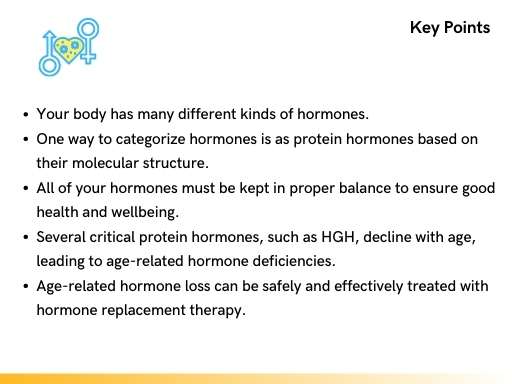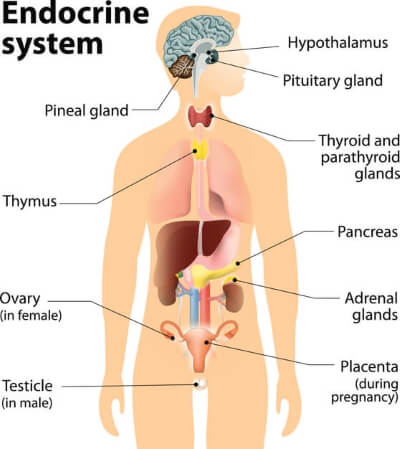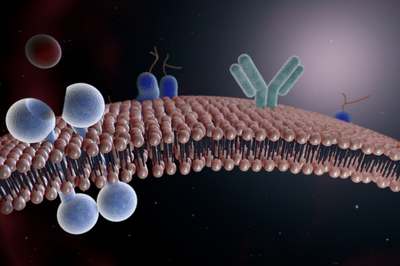 Your body produces many different kinds of hormones. They differ in their chemical structures, the points of origin, and how they interact with their target cells. Protein hormones are those that are made up of long chains of amino acids. Such long-chain amino acid proteins are also known as peptides, and the protein hormones are often also referred to as peptide hormones.
Your body produces many different kinds of hormones. They differ in their chemical structures, the points of origin, and how they interact with their target cells. Protein hormones are those that are made up of long chains of amino acids. Such long-chain amino acid proteins are also known as peptides, and the protein hormones are often also referred to as peptide hormones.
Some of the most important peptide or protein hormones are human growth hormone, insulin, and the hypothalamic hormones, which include growth hormone-releasing hormone (GHRH), dopamine, and gonadotrophin-releasing hormone.
Amino acid-derived hormones, such as protein hormones, are water-soluble as opposed to fat-soluble. Water-soluble hormones cannot cross a cell membrane which means they must interact with specialized receptors that are located on the outer surfaces of their biological targets.
What Are Protein Hormones
Hormones are your body’s chemical messengers. They are specialized chemicals that interact with specific hormone receptors in the cells of your tissue and organs to stimulate or regulate dozens of biological processes. Your body simply could not function without hormones. Your body produces over 50 different individual hormones. The majority of them are considered “protein hormones” because they are made up of building blocks of all proteins – amino acids, organized in long chains. Since they are long chains of amino acids, they are also called “peptide hormones.”
Where are Protein Hormones Produced and Released?
 Protein hormones are produced and released by the glands of the endocrine system. Like all hormones, the protein hormones are very specific in nature and can only react with particular hormone receptors in the cells of their target organs to bring about biological changes.
Protein hormones are produced and released by the glands of the endocrine system. Like all hormones, the protein hormones are very specific in nature and can only react with particular hormone receptors in the cells of their target organs to bring about biological changes.
The glands and organs that produce and secrete the protein hormones include:
- The pituitary gland
- The pancreas
- The hypothalamus
Hormones are often categorized as either “fat-soluble” hormones or “water-soluble” hormones based on their mechanisms of action. Fat-soluble hormones can permeate or dissolve through the walls of the cell membrane to reach their hormone receptors. The protein and peptide hormones are water-soluble hormones which means they must interact with receptors on the outer surface of the cell walls.
What Processes Do the Protein Hormones Regulate?
The protein hormones stimulate some of your body’s most important processes, including growth, protein synthesis, blood sugar levels, and the conversion of calories in the foods you eat into energy for your cells.
Examples of Protein hormones
Because of the key processes they stimulate or regulate, protein hormones are especially important to your overall health and wellbeing. Maintaining a proper balance of your pituitary hormones, human growth hormone (HGH), insulin, hypothalamic hormones, and glucagon is essential to optimal health.
Pituitary Hormones
The pituitary gland is one of the main glands of the endocrine system. It produces no less than six major hormones: prolactin, human growth hormone, adrenocorticotropic hormone, luteinizing hormone, follicle-stimulating hormone, and thyroid-stimulating hormone. These hormones are all, in one way or another, involved in growth, reproduction, metabolism, temperature regulation, blood pressure, and other vital biological processes. Because of the critical anatomical processes they influence, imbalances of any of the pituitary hormones can lead to serious health issues.
Human Growth Hormone
Of all of your body’s many hormones, human growth hormone, or HGH, is probably one of the most important. As the name implies, HGH is responsible for “growth.” Therefore, it controls, stimulates, or regulates every process that allows a child to grow into a healthy adult of full stature. Children with growth hormone deficiencies will fail to make growth milestones consistent with their age. Even in your adult years, HGH continues to play a vital role in your overall health and wellbeing.
You need HGH to build muscle and regulate metabolism. HGH is responsible for the growth and repair of every cell of every tissue of your body. Therefore, it is essential for healing, immunity, and recovery from disease or injury. As vital as HGH is, unfortunately, your HGH level declines as you age. This results in what is known as “age-related” or “adult-onset” growth hormone deficiency. Age-related growth hormone deficiency can lead to a number of negative issues, such as loss of lean muscle, weight gain, lack of energy, and sexual health issues. In fact, many of the debilitating conditions we think of as “old age” occur from loss of HGH.
Insulin
Surely you have heard of insulin and its relationship to “blood sugar” and “diabetes.” Insulin is a protein hormone produced by the pancreas. Basically, insulin is the protein that draws sugar out of your bloodstream and into your cells for energy. If you are not producing enough insulin or your cells are not recognizing and reacting to the presence of insulin properly, diabetes, or “high blood sugar” is the result. Diabetes is a serious condition, that, untreated, can lead to limb loss, blindness, and even death.
Hypothalamic hormones
The hypothalamus is located on the undersurface of the brain. It lies just above the pituitary gland, and like the pituitary, it produces several important protein hormones. The hypothalamic hormones are all involved in keeping your body stable, a condition of optimal health known as homeostasis. The important hypothalamic hormones include growth hormone-releasing hormone (GHRH), dopamine, and gonadotrophin-releasing hormone. Most of the hypothalamic hormones stimulate the production and release of other important hormones. Therefore, any imbalance in these hormones can lead to imbalances of other essential hormones and severe health consequences.
Glucagon
Glucagon, like insulin, is another protein hormone secreted by your pancreas to regulate the level of glucose or sugar in your blood. Glucagon acts as the opposite of insulin. It increases your blood sugar level and prevents it from dropping too low, whereas insulin decreases blood sugar levels. Imbalances of either hormone can cause too much or too little glucose in your blood which can cause several health issues and complications.
Conclusion
All of the hormones produced by your body, including your protein hormones, must work together in concert. If the levels of any or your hormones are off – and in particular the protein hormones – a hormone imbalance can occur.
 Hormone imbalances can have several negative health consequences. Imbalances of the protein hormones, in particular of HGH, insulin, and the hypothalamic hormones, can have severe health consequences.
Hormone imbalances can have several negative health consequences. Imbalances of the protein hormones, in particular of HGH, insulin, and the hypothalamic hormones, can have severe health consequences.
This is particularly true as we get older. As men and women age, the level of many critical hormones drop both protein hormones like HGH and steroid hormones like testosterone. This age-related loss of these and other hormones can cause a hormone imbalance that often results in weakness, lack of energy, weight gain, and sexual health issues.
Age-related hormone loss of protein hormones and other hormones is treated with hormone replacement therapy, also known as HRT. Depending on your symptoms and diagnosis, hormone therapy can include the replacement of both protein and other kinds of hormones. For example, testosterone and human growth hormone are often prescribed together – particularly for men experiencing age-related hormone deficiencies.
This combination approach has proven to be very beneficial for our patients. Patients benefit from combining HGH replacement with testosterone therapy because the overall benefits of both hormone replacement therapies produce synergistic effects that combine to produce the following positive results.
- Increased strength and energy.
- Improved ability to build lean muscle.
- Weigh loss.
- Improved sexual function.
- Improved cognition.
- Improved mood.
However, only your doctor can determine if you are suffering from a protein hormone or other type of hormone imbalance. If you are a man over the age of 45 and are not feeling or looking as well as you think you should, it may be time to have your hormone levels checked.

